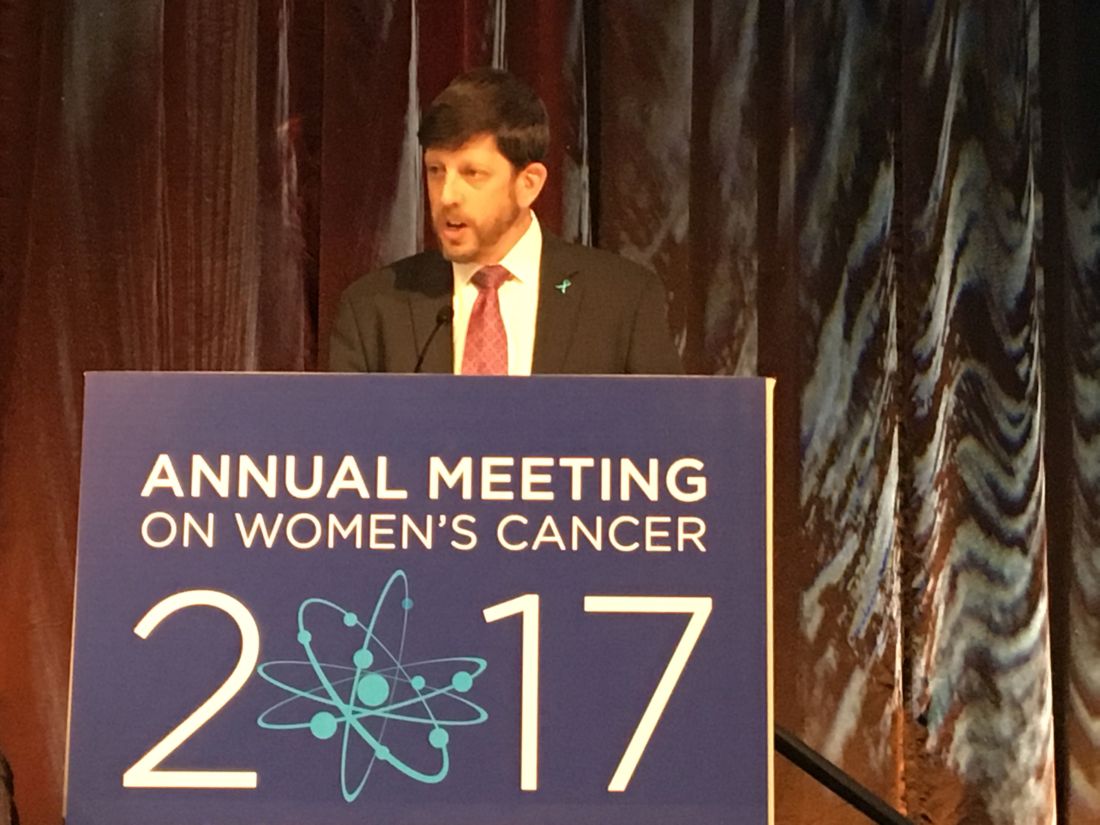User login
NATIONAL HARBOR, MD – An investigational targeted immunotherapy led to a 52% improvement in overall survival, compared with pooled historical data, among patients with previously treated metastatic cervical cancer.
Patients in the phase II trial who received axalimogene filolisbac (AXAL) had a 12-month overall survival (OS) rate of 38%, which significantly exceeded the predicted rate of 25% had they gone untreated (P = .02), Charles Leath, MD, said during a late-breaking presentation at the annual meeting of the Society of Gynecologic Oncology. Investigators are now recruiting for a placebo-controlled phase III trial of AXAL in the adjuvant setting, he said.
In a previous trial in India, therapy with AXAL was associated with a 12-month OS of 34% among patients with persistent or recurrent metastatic cervical cancer. For the current trial, 50 women with persistent or recurrent metastatic cervical cancer despite prior systemic therapy received intravenous AXAL (1 x 109 CFU) every 28 days for up to three doses or until disease progression. Patients had a median age of 46 years, and most had a Gynecologic Oncology Group (GOG) performance status of 0. Most patients had received at least two previous lines of treatment, more than half had received bevacizumab, and 86% had received pelvic radiation, Dr. Leath reported.
Median overall survival time was 6.2 months (95% confidence interval, 4.4-12.3 months), and 44% of patients progressed on therapy, while 30% had stable disease. The only complete response occurred in a patient with squamous cell carcinoma of the cervix who developed pelvic recurrence 7 years after undergoing radical hysterectomy. She received paclitaxel/carboplatin, bevacizumab, and pelvic radiation, and her cancer recurred 1 year later. She subsequently received three intravenous doses of AXAL and has survived 18.5 months so far, Dr. Leath said.
Treatment-related adverse events affected 96% of patients, and usually consisted of grade 1 or 2 fatigue, chills, anemia, nausea, and fever. A total of 36% of patients had grade 3 treatment-related adverse events, of which anemia was the most common. One patient developed grade 4 hypotension that was considered probably related to treatment, and one patient developed grade 4 Klebsiella pneumonia and sepsis deemed possibly related to treatment.
The survival curve dropped off steeply at first and then had a long tail, reflecting the delayed effects of immunotherapy, Dr. Leath commented. For the phase III trial, patients with high-risk cervical cancer will receive at least 3 weeks of cisplatin and external beam radiation therapy before being randomly assigned to either intravenous AXAL (1 x 109 CFU) or placebo for up to 1 year, he added.
The trial was funded by the Gynecologic Oncology Group, Advaxis, and the National Cancer Institute. Dr. Leath disclosed grant funding from Celsion, Novartis, Astra Zeneca, and Plexikkon, and disclosed honoraria or reimbursements from Celsion and Genentech/Roche.
NATIONAL HARBOR, MD – An investigational targeted immunotherapy led to a 52% improvement in overall survival, compared with pooled historical data, among patients with previously treated metastatic cervical cancer.
Patients in the phase II trial who received axalimogene filolisbac (AXAL) had a 12-month overall survival (OS) rate of 38%, which significantly exceeded the predicted rate of 25% had they gone untreated (P = .02), Charles Leath, MD, said during a late-breaking presentation at the annual meeting of the Society of Gynecologic Oncology. Investigators are now recruiting for a placebo-controlled phase III trial of AXAL in the adjuvant setting, he said.
In a previous trial in India, therapy with AXAL was associated with a 12-month OS of 34% among patients with persistent or recurrent metastatic cervical cancer. For the current trial, 50 women with persistent or recurrent metastatic cervical cancer despite prior systemic therapy received intravenous AXAL (1 x 109 CFU) every 28 days for up to three doses or until disease progression. Patients had a median age of 46 years, and most had a Gynecologic Oncology Group (GOG) performance status of 0. Most patients had received at least two previous lines of treatment, more than half had received bevacizumab, and 86% had received pelvic radiation, Dr. Leath reported.
Median overall survival time was 6.2 months (95% confidence interval, 4.4-12.3 months), and 44% of patients progressed on therapy, while 30% had stable disease. The only complete response occurred in a patient with squamous cell carcinoma of the cervix who developed pelvic recurrence 7 years after undergoing radical hysterectomy. She received paclitaxel/carboplatin, bevacizumab, and pelvic radiation, and her cancer recurred 1 year later. She subsequently received three intravenous doses of AXAL and has survived 18.5 months so far, Dr. Leath said.
Treatment-related adverse events affected 96% of patients, and usually consisted of grade 1 or 2 fatigue, chills, anemia, nausea, and fever. A total of 36% of patients had grade 3 treatment-related adverse events, of which anemia was the most common. One patient developed grade 4 hypotension that was considered probably related to treatment, and one patient developed grade 4 Klebsiella pneumonia and sepsis deemed possibly related to treatment.
The survival curve dropped off steeply at first and then had a long tail, reflecting the delayed effects of immunotherapy, Dr. Leath commented. For the phase III trial, patients with high-risk cervical cancer will receive at least 3 weeks of cisplatin and external beam radiation therapy before being randomly assigned to either intravenous AXAL (1 x 109 CFU) or placebo for up to 1 year, he added.
The trial was funded by the Gynecologic Oncology Group, Advaxis, and the National Cancer Institute. Dr. Leath disclosed grant funding from Celsion, Novartis, Astra Zeneca, and Plexikkon, and disclosed honoraria or reimbursements from Celsion and Genentech/Roche.
NATIONAL HARBOR, MD – An investigational targeted immunotherapy led to a 52% improvement in overall survival, compared with pooled historical data, among patients with previously treated metastatic cervical cancer.
Patients in the phase II trial who received axalimogene filolisbac (AXAL) had a 12-month overall survival (OS) rate of 38%, which significantly exceeded the predicted rate of 25% had they gone untreated (P = .02), Charles Leath, MD, said during a late-breaking presentation at the annual meeting of the Society of Gynecologic Oncology. Investigators are now recruiting for a placebo-controlled phase III trial of AXAL in the adjuvant setting, he said.
In a previous trial in India, therapy with AXAL was associated with a 12-month OS of 34% among patients with persistent or recurrent metastatic cervical cancer. For the current trial, 50 women with persistent or recurrent metastatic cervical cancer despite prior systemic therapy received intravenous AXAL (1 x 109 CFU) every 28 days for up to three doses or until disease progression. Patients had a median age of 46 years, and most had a Gynecologic Oncology Group (GOG) performance status of 0. Most patients had received at least two previous lines of treatment, more than half had received bevacizumab, and 86% had received pelvic radiation, Dr. Leath reported.
Median overall survival time was 6.2 months (95% confidence interval, 4.4-12.3 months), and 44% of patients progressed on therapy, while 30% had stable disease. The only complete response occurred in a patient with squamous cell carcinoma of the cervix who developed pelvic recurrence 7 years after undergoing radical hysterectomy. She received paclitaxel/carboplatin, bevacizumab, and pelvic radiation, and her cancer recurred 1 year later. She subsequently received three intravenous doses of AXAL and has survived 18.5 months so far, Dr. Leath said.
Treatment-related adverse events affected 96% of patients, and usually consisted of grade 1 or 2 fatigue, chills, anemia, nausea, and fever. A total of 36% of patients had grade 3 treatment-related adverse events, of which anemia was the most common. One patient developed grade 4 hypotension that was considered probably related to treatment, and one patient developed grade 4 Klebsiella pneumonia and sepsis deemed possibly related to treatment.
The survival curve dropped off steeply at first and then had a long tail, reflecting the delayed effects of immunotherapy, Dr. Leath commented. For the phase III trial, patients with high-risk cervical cancer will receive at least 3 weeks of cisplatin and external beam radiation therapy before being randomly assigned to either intravenous AXAL (1 x 109 CFU) or placebo for up to 1 year, he added.
The trial was funded by the Gynecologic Oncology Group, Advaxis, and the National Cancer Institute. Dr. Leath disclosed grant funding from Celsion, Novartis, Astra Zeneca, and Plexikkon, and disclosed honoraria or reimbursements from Celsion and Genentech/Roche.
Key clinical point. Treatment with axalimogene filolisbac led to a 52% improvement in overall survival, compared with pooled historical data, in previously treated patients with metastatic cervical cancer.
Major finding: Twelve-month overall survival was 38%, significantly greater than the modeled prediction of 25% had patients gone untreated (P = .02).
Data source: A multicenter phase II trial of 50 patients with previously treated metastatic cervical cancer.
Disclosures: The study was supported by the Gynecologic Oncology Group, Advaxis, and the National Cancer Institute. Dr. Leath disclosed grant funding from Celsion, Novartis, Astra Zeneca, and Plexikkon, and honoraria or reimbursements from Celsion and Genentech/Roche.

